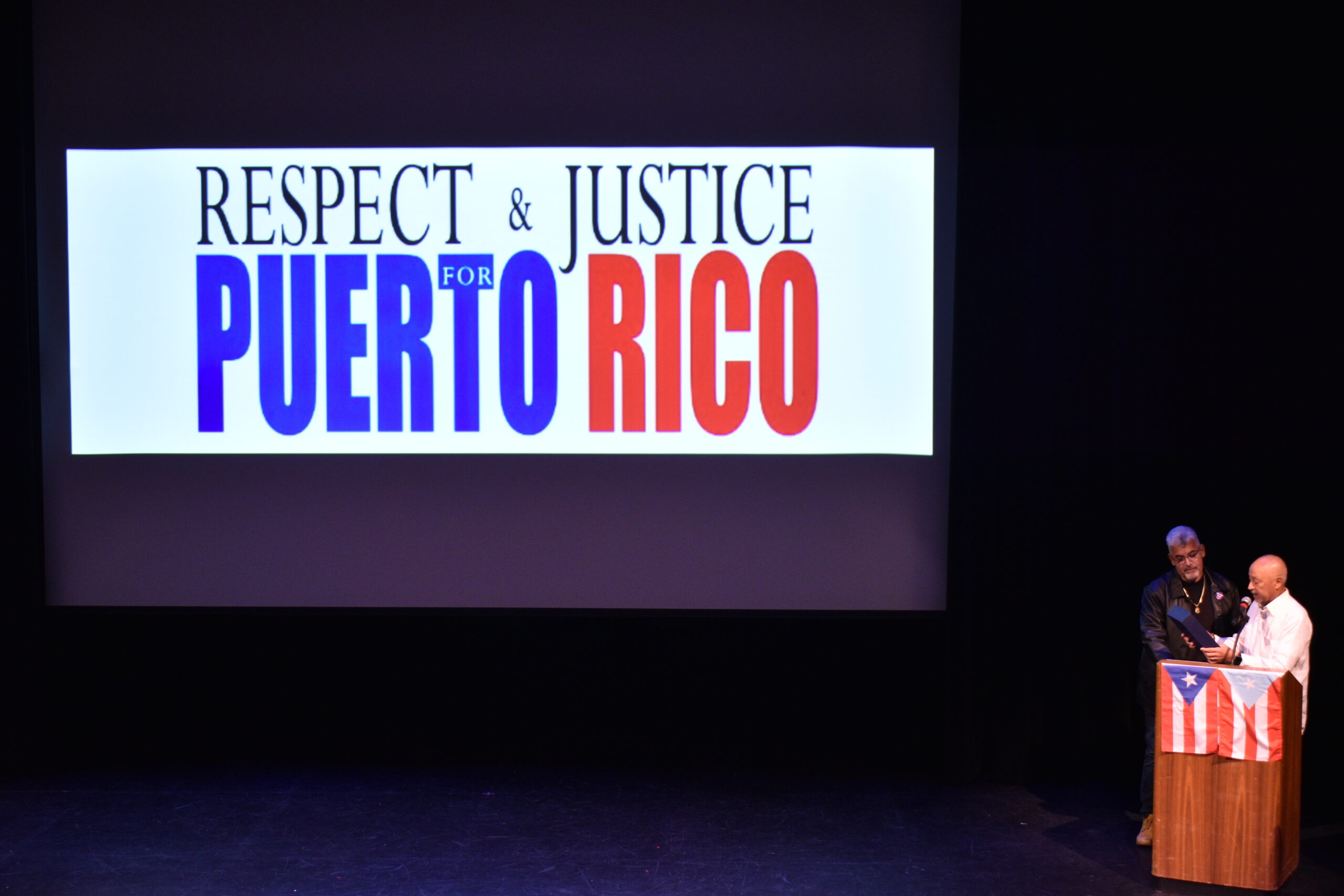Puerto Rican culture was on full display at Hostos Community College on Dec. 13, as five prominent members of the Borinqueño community were honored with the third annual Urayoán award.
The award is granted annually by the nonprofit group Respect & Justice for Puerto Rico to standout members of the city’s Puerto Rican community, to draw attention to the injustice of the Jones Act. That century-old law prohibits non-US ships from docking in Puerto Rico, resulting in higher prices and cumbersome bureaucratic delays on crucial supplies for the islanders.
Urayoán was an indigenous Cacique from Puerto Rico who spread the word among his fellow native islanders that the conquering Spaniards were not Gods, and should have been opposed rather than worshipped.
Among the awardees were iconic salsa duo Richie Ray and Bobby Cruz, who are featured in Los Reyes de la Salsa, a new documentary about their rise as stars of the musical genre and their subsequent move toward Christianity.
According to the host of Catedral de la Salsa radio station Mario Chiclana, Ray and Cruz’s advocacy through music helped spread awareness about Puerto Rico’s culture and its fight against injustice.
“A few songs that they have they talk about justice, and the lyrics says it all,” said Chiclana. One of their classics, “La Zafra,” highlights a long history of injustice for native Puerto Ricans, mentioning US sugar companies paying low wages to sugar plantation workers in tough conditions.
The other recipients of this year’s Urayoán award were renowned photographer South Bronx Joe Conzo Jr. of Seis del Sur, Silent Procession for Puerto Rico President Carmen Cruz, City Councilman Rafael Salamanca Jr. and the filmmakers of “Los Reyes de La Salsa.”
The awards were presented by nonprofit group Respect & Justice 4 Puerto Rico, whose founder, South Bronx native Julio Pabόn, wants to educate the public and organize efforts to exempt Puerto Rico from the Jones Act. The law “has played a negative impact on the economy of the Puerto Rican community, and we saw it when Maria hit, so it’s a burden on its economy,” said Councilman Salamanca. “Education needs to continue until we address this issue.”
Heads of financial management appointed by the US government profit from the territory’s debt, say critics of the law.
Raymond Rivera, president of the Latino Pastoral Action Center, said he is worried not just about the ongoing effects of the Jones Act, he is also concerned with what the incoming presidential administration will mean for Puerto Rico.
“I have nothing but apprehension about a second Trump administration and how they’re going to treat Puerto Rico and how they’re going to double down on trying to exploit Puerto Rico even more,” said Rivera, who is also a bishop.
But the Jones Act has been a big problem for the island under both Democratic and Republican administrations, said Salamanca.
Representatives recounted how, after Hurricane Fiona in 2022, it took Pres. Joe Biden eight days to approve a waiver to the law, allowing a non-American ship to dock in Puerto Rico to bring oil after a power outage from the storm, Politico reported.
The law also impeded Puerto Rico from receiving aid after Category One Hurricane Ernesto knocked out power for more than half a million customers. A diesel barge headed for South America changed course to bring its precious cargo to Puerto Rico, would have been required to dock in Florida first under the constraints of the law. It was only after local elected officials got involved to demand an exception to the Jones Act that the barge was permitted to head straight to the island. As a result of the bureaucratic delay, islanders were without power for a prolonged period before the federal government waived the law.
Watching “Los Reyes de La Salsa” reminded Orpha Rivera, who went to school with Pabόn, of her activism fighting for justice for Puerto Rico alongside Pabόn in the 1960s.
“We used to do picketing and politics and everything,” she recalled.
Isabela, a 12-year-old Melrose resident who joined her grandmother at the event, said she learned important things she didn’t know about her ancestral homeland.
“I got to see what’s going on in Puerto Rico that I did, I personally didn’t know,” she said.
Tammy Zanders, 27, said that what she learned about the Jones Act prompted her to take action.
“I want to know more about it and see what I can do on an individual level,” she said.
The story was updated on Jan. 3 to point out that Councilman Rafael Salamanca Jr. was among the five honorees, and the song La Zafra refers to American colonialism.

